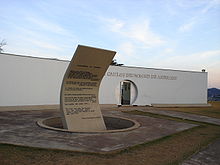Carlos Drummond de Andrade
Carlos Drummond de Andrade (Itabira, Minas Gerais, October 31, 1902 - Rio de Janeiro, August 17, 1987) was a Brazilian poet, journalist and politician. At the age of 23 he edited, together with other writers, La Revista , whose objective was to disseminate the expressions of Brazilian modernism, a movement that had its beginning during the Modern Art Week held in São Paulo during 1922.
Biography

His parents were Carlos de Paula Andrade and Julieta Augusta Drummond. Drummond had 13 siblings, in a family in the interior of the State of Minas Gerais. His family had origins in the colonial past of Minas Gerais.
He moved to the capital, Belo Horizonte, in 1920. This year, Drummond published his first report, in the Jornal de Minas. After writing some articles and essays, he began to work on the agenda of Minas, where he wrote for the next ten years. In 1925 Andrade entered the Faculty of Pharmacy in Belo Horizonte, he graduated although he never practiced his profession.. Together with his friend Emilio Moura and other friends he founded La Revista , which was one of the main organs of dissemination of local modernism. In 1930 he published his first book Some Poetry. In 1934 he moved permanently to Rio de Janeiro, occupying the position of chief of staff of the new Minister of Education and Public Health. In that same year he saw the light of day his second work Brejo das Almas and in 1940 Sentimiento do Mundo .
At the end of the Second World War and the fall of Getúlio Vargas's government, he served for a short period as director of the newspaper Tribuna Popular. He returned to the Ministry of Education, serving in the Directorate of Historical and Artistic Heritage. In parallel, an intense journalistic activity as well as a very rich poetic work. He exercised in his country first and then in the world the representation of the high values of Brazilian modernism (non-dogmatic nationalism, empathy with the people, non-academic creativity and total freedom of speech). At the time, his conscience did not tremble when he renounced a very important national award that was accompanied by a large amount of money since it was awarded by the then military government of his country.
From his first books Drummond's poetry stood out from the rest; It is a verbal gift of the highest quality; It is authentic, legitimate and great. He always maintained a close relationship with people by practicing poems and his press prose. This enormous Brazilian author (he has published 28 books of poetry) is considered by critics to be one of the greatest poets in Brazil.
She died on August 17, 1987 in the city of Rio de Janeiro, twelve days after the death of her only daughter María Julieta Drummond de Andrade, due to cancer, she had cared for and followed her daughter's illness, and her departure devastated him, hastening his own. He achieved great repercussion with his books and despite having been a strong candidate for the Nobel Prize in Literature he rejected any nomination for the Prize.
Works
Poetry
- Alguma Poesia (1930)
- Brejo das Almas (1934)
- Sentimento do mundo (1940)
- José (1942)
- A Rosa do Povo (1945)
- Claro Enigma (1951)
- Fazendeiro do ar (1954)
- Quadrilha (1954)
- Viola de Bolso (1955)
- Lição de Coisas (1964)
- Boitempo (1968)
- In the absence of love (1968)
- Nudity (1968)
- As Impurezas do Branco (1973)
- Menino Antigo (Boitempo II) (1973)
- A Visit (1977)
- Spring and Shadows Speech (1977)
- O marginal Clorindo Gato (1978)
- Scheme for Lembrar (1979)
- A Paixão Medida (1980)
- Case of Dress (1983)
- Corpo (1984)
- Eu, label (1984)
- Love learns by loving (1985)
- Poesia Errante (1988)
- O Love Natural (1992)
- Farewell (1996)
- Bears suportam or world(1935)
- Football to art (1970)
- Naróta do Coxordão (1971)
- Da utilidae dos animais
Poetic anthologies
- To last pedra no meu caminho (1950)
- 50 poems sculpted hair author (1956)
- Poetic Anthology (1962)
- Poetic Anthology (1965)
- Seleta em Prosa e Verso (1971)
- Love, Love (1975)
- Carmina drummondiana (1982)
- Boitempo I and Boitempo II (1987)
- Minha morte (1987)
Literature for children
- O Elefante (1983)
- History of dois amores (1985)
- O pintinho (1988)
- Rick and Girafa
Narrative
- Confissões de Minas (1944)
- Contos de Aprendiz (1951)
- Passeios na Ilha (1952)
- Fala, amendoeira (1957)
- A bag " a life (1962)
- A minha Voda (1964)
- Cadeira de balanço (1966)
- Caminhos de João Brandão (1970)
- Or power ultrajovem e mais 79 texts em prosa e verse (1972)
- From news " não-notícias faz-se a crônica (1974)
- Cute days (1977)
- 70 historinhas (1978)
- Contos plausíveis (1981)
- Boca de luar (1984)
- O observer no escritório (1985)
- Early Life Poesia (1986)
- Moça deitada na grama (1987)
- O bird das coisas (1988)
- Self-portrait e outras crônicas (1989)
- As histórias das muralhas (1989)
Spanish translations
- The Bag & Life (Instantia of Brazilian Life), translation Maria Rosa Oliver. Editions of the Flower, 1973.
- Natural love. Or natural love in version of Jesus Munarriz. With an epilogue of Manel Graña Etcheverry. Bilingual edition. Madrid, Editions Hiperión, 2004. ISBN 978-84-7517-796-0.
- Feeling of the world (Sentiment of the world). Translation by Adolfo Montejo Navas. Bilingual edition. Madrid, Editions Hiperión, 2005. ISBN 978-84-7517-865-3.
- The reverse of things. Translation of Oscar Limache and Ohmar Cachay Limache. Lima: Amotape Libros, 2014. ISBN 978-61-246-95-9.